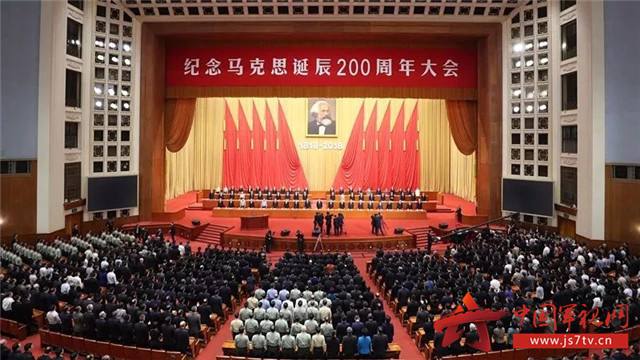在紀(jì)念馬克思誕辰200周年大會上的講話
Speech at the Ceremony Commemorating the Bicentenary of the Birth of Marx
習(xí)近平 Xi Jinping
2018年5月4日 May 4, 2018

同志們:
Comrades,
今天,我們懷著十分崇敬的心情,在這里隆重集會,紀(jì)念馬克思誕辰200周年,緬懷馬克思的偉大人格和歷史功績,重溫馬克思的崇高精神和光輝思想。
Today, we
gather here filled with reverence to commemorate the 200th anniversary of the
birth of Karl Marx, remember his strong character and historical achievements,
and review his eminent spirit and brilliant ideas.
馬克思是全世界無產(chǎn)階級和勞動人民的革命導(dǎo)師,是馬克思主義的主要創(chuàng)始人,是馬克思主義政黨的締造者和國際共產(chǎn)主義的開創(chuàng)者,是近代以來最偉大的思想家。兩個世紀(jì)過去了,人類社會發(fā)生了巨大而深刻的變化,但馬克思的名字依然在世界各地受到人們的尊敬,馬克思的學(xué)說依然閃爍著耀眼的真理光芒!
Marx is the
revolutionary leader of the proletariat and the working people the world over,
the principal founder of Marxism, the founder of Marxist parties
and of the international communist movement, and the greatest thinker of the
modern era. Two centuries have passed, during which human society has undergone
massive and profound changes. However, Marx’s name continues to be met with
respect around the world, and Marx’s theories continue to emanate their
brilliant rays of truth.
1818年5月5日,馬克思誕生在德國特里爾城的一個律師家庭。早在中學(xué)時代,他就樹立了為人類幸福而工作的志向。大學(xué)時代,馬克思廣泛鉆研哲學(xué)、歷史學(xué)、法學(xué)等知識,探尋人類社會發(fā)展的奧秘。在《萊茵報》工作期間,馬克思犀利抨擊普魯士政府的專制統(tǒng)治,維護(hù)人民權(quán)利。1843年移居巴黎后,馬克思積極參與工人運動,在革命實踐和理論探索的結(jié)合中完成了從唯心主義到唯物主義、從革命民主主義到共產(chǎn)主義的轉(zhuǎn)變。1845年,馬克思、恩格斯合作撰寫了《德意志意識形態(tài)》,第一次比較系統(tǒng)地闡述了歷史唯物主義基本原理。1848年,馬克思、恩格斯合作撰寫了《共產(chǎn)黨宣言》,一經(jīng)問世就震動了世界。恩格斯說,《共產(chǎn)黨宣言》是“全部社會主義文獻(xiàn)中傳播最廣和最具有國際性的著作,是從西伯利亞到加利福尼亞的千百萬工人公認(rèn)的共同綱領(lǐng)”。
On May 5, 1818,
Marx was born in Trier, Germany, into a lawyer’s household. As early as his
middle school years, Marx aspired to work toward human happiness. During his
university years, Marx undertook extensive and intensive studies into
philosophy, history, and law in pursuit of the secrets underlying the
development of human society. When he was working for the Rheinische
Zeitung newspaper, Marx wrote incisive articles attacking the
autocratic rule of the Prussian government and defending the rights of the
people. In 1843, after he moved to Paris, Marx became an active participant in
the workers’ movement. In the course of his participation he brought together
revolutionary practice with theoretical inquiry, thus completing his shift from
idealist to materialist and from revolutionary democrat to communist. In 1845,
Marx and Engels coauthored The German Ideology, which was the first
relatively systematic elaboration of the basic principles of historical
materialism. In 1848, Marx and Engels coauthored Manifesto
of the Communist Party – which, once published, immediately shook the
world. Of Manifesto of the Communist Party, Engels
said that it is “the most widespread, the most international production of all
socialist literature, the common platform acknowledged by millions of
workingmen from Siberia to California.”
1848年,席卷歐洲的資產(chǎn)階級民主革命爆發(fā),馬克思積極投入并指導(dǎo)這場革命斗爭。革命失敗后,馬克思深刻總結(jié)革命教訓(xùn),力求通過系統(tǒng)研究政治經(jīng)濟(jì)學(xué),揭示資本主義的本質(zhì)和規(guī)律。1867年問世的《資本論》是馬克思主義最厚重、最豐富的著作,被譽(yù)為“工人階級的圣經(jīng)”。晚年,馬克思依然密切關(guān)注世界發(fā)展新趨勢和工人運動新情況,努力從更宏大的視野思考人類社會發(fā)展問題。
In 1848, as
the bourgeois democratic revolution sweeping across Europe erupted, Marx threw
himself into and guided this struggle. Following the failure of the revolution,
Marx reviewed the lessons learned from the revolution and subjected them to a
systematic politico-economic analysis, thus revealing the nature and patterns
governing capitalism. In 1867, Capitalwas published, which is his
most profound and fecund work, and which has been honored as the “Bible of the
working class.” In his later years, Marx continued to closely watch new trends
in global development and new events in the workers’ movement, making great
efforts at reflecting on issues concerning human development from an even
greater viewpoint.
——馬克思的一生,是胸懷崇高理想、為人類解放不懈奮斗的一生。1835年,17歲的馬克思在他的高中畢業(yè)作文《青年在選擇職業(yè)時的考慮》中這樣寫道:“如果我們選擇了最能為人類而工作的職業(yè),那么,重?fù)?dān)就不能把我們壓倒,因為這是為大家作出的犧牲;那時我們所享受的就不是可憐的、有限的、自私的樂趣,我們的幸福將屬于千百萬人,我們的事業(yè)將悄然無聲地存在下去,但是它會永遠(yuǎn)發(fā)揮作用,而面對我們的骨灰,高尚的人們將灑下熱淚。”馬克思一生飽嘗顛沛流離的艱辛、貧病交加的煎熬,但他初心不改、矢志不渝,為人類解放的崇高理想而不懈奮斗,成就了偉大人生。
Marx’s life
was a life of harboring lofty ideals and of dedication to the struggle for the
emancipation of humankind. In 1835, a 17-year-old Marx wrote a high-school
graduation composition entitled “Reflections of a Young Man on the Choice of a
Profession” in which he wrote, “If we have chosen the position in life in which
we can most of all work for mankind, no burdens can bow us down, because they
are sacrifices for the benefit of all; then we shall experience no petty,
limited, selfish joy, but our happiness will belong to millions, our deeds will
live on quietly but perpetually be at work, and over our ashes will be shed the
hot tears of noble people.” Throughout his life, Marx encountered hardships
from an errant life and suffered poverty and illness, yet he stayed the course,
never swayed from his original aspiration, dedicated himself to the lofty ideal
of the emancipation of humankind, and accomplished a life of greatness.
——馬克思的一生,是不畏艱難險阻、為追求真理而勇攀思想高峰的一生。馬克思曾經(jīng)寫道:“在科學(xué)上沒有平坦的大道,只有不畏勞苦沿著陡峭山路攀登的人,才有希望達(dá)到光輝的頂點。”馬克思為創(chuàng)立科學(xué)理論體系,付出了常人難以想象的艱辛,最終達(dá)到了光輝的頂點。他博覽群書、廣泛涉獵,不僅深入了解和研究哲學(xué)社會科學(xué)各個學(xué)科知識,而且深入了解和研究各種自然科學(xué)知識,努力從人類創(chuàng)造的一切文明成果中汲取養(yǎng)料。馬克思畢生忘我工作,經(jīng)常每天工作16個小時。馬克思在給友人的信中談到,為了《資本論》的寫作,“我一直在墳?zāi)沟倪吘壟腔病R虼耍也坏貌焕梦疫€能工作的每時每刻來完成我的著作”。即使在多病的晚年,馬克思仍然不斷邁向新的科學(xué)領(lǐng)域和目標(biāo),寫下了數(shù)量龐大的歷史學(xué)、人類學(xué)、數(shù)學(xué)等學(xué)科筆記。正如恩格斯所說:“馬克思在他所研究的每一個領(lǐng)域,甚至在數(shù)學(xué)領(lǐng)域,都有獨到的發(fā)現(xiàn),這樣的領(lǐng)域是很多的,而且其中任何一個領(lǐng)域他都不是淺嘗輒止。”
Marx’s life
was a life of defiance in the face of hardships and of bravely scaling new
intellectual heights in search of truth. Marx once wrote that, “There is no
royal road to science, and only those who do not dread the fatiguing climb of
its steep paths have a chance of gaining its luminous summits.” In founding his
scientific theoretical system, Marx endured hardships unimaginable to most
ordinary people until ultimately arriving at the luminous summit. Being
well-read and erudite, he not only thoroughly understood and studied the
scholarship of all disciplines of philosophy and the social sciences, but also
that of a range of natural sciences, diligently working to draw pabulum from
the civilizational achievements of all of humankind. Throughout his life, Marx
selflessly dedicated himself to his work, regularly working sixteen hours a
day. Of his work Capital, Marx once wrote a letter to his
friend saying that, “I was perpetually hovering on the verge of the grave.
Therefore, I had to use every moment in which I was capable of work in order
that I might finish the task.” Despite constant illness in his later years,
Marx still continued to stride toward new scientific fields and objectives, and
he wrote an immense number of scientific manuscripts in the fields of history,
humanities, and mathematics. Just as Engels said, “In every single field which
Marx investigated – and he investigated very many fields, none of them
superficially – in every field, even in that of mathematics, he made
independent discoveries.”
——馬克思的一生,是為推翻舊世界、建立新世界而不息戰(zhàn)斗的一生。恩格斯說,“馬克思首先是一個革命家”,“斗爭是他的生命要素。很少有人像他那樣滿腔熱情、堅韌不拔和卓有成效地進(jìn)行斗爭”。馬克思畢生的使命就是為人民解放而奮斗。為了改變?nèi)嗣袷軇兿鳌⑹軌浩鹊拿\,馬克思義無反顧投身轟轟烈烈的工人運動,始終站在革命斗爭最前沿。他領(lǐng)導(dǎo)創(chuàng)建了世界上第一個無產(chǎn)階級政黨——共產(chǎn)主義者同盟,領(lǐng)導(dǎo)了世界上第一個國際工人組織——國際工人協(xié)會,熱情支持世界上第一次工人階級奪取政權(quán)的革命——巴黎公社革命,滿腔熱情、百折不撓推動各國工人運動發(fā)展。
Marx’s life was a life of ceaseless
fighting to topple the old world and create it anew. As Engels said, “Marx was
before all else a revolutionist... Fighting was his element. And he fought with
a passion, a tenacity, and a success such as few could rival.” Marx’s lifelong
mission was to struggle for the emancipation of humankind. In order to change
the people’s lot of suffering exploitation and oppression, Marx threw himself
without hesitation into the dynamic worker’s movement, always standing at the
vanguard of the revolutionary fight. Under his leadership, the Communist League
was founded in 1847, which was the world’s first proletarian party, and he led
the International Workingmen’s Association which was the world’s first
international workers’ organization. He also zealously supported the Commune of
Paris, the first revolution in which the working class seized political power,
and fervently and unrelentingly drove the development of the workers’ movement
across the world.
馬克思是頂天立地的偉人,也是有血有肉的常人。他熱愛生活,真誠樸實,重情重義。馬克思、恩格斯的革命友誼長達(dá)40年。正如列寧所說:“古老傳說中有各種非常動人的友誼故事”,但馬克思、恩格斯的友誼“超過了古人關(guān)于人類友誼的一切最動人的傳說”。馬克思無私資助革命事業(yè),即使在自己生活極度困難的情況下仍然盡最大努力幫助革命戰(zhàn)友。馬克思和妻子燕妮患難與共,譜寫了理想和愛情的命運交響曲。
Marx was a great man of indomitable spirit, yet he was also a man of flesh and blood. He loved life, and was sincere, honest, sentimental, and fair-minded. Marx and Engels’ revolutionary friendship lasted for 40 years. Just as Lenin once said that, “Old legends contain various moving instances of friendship,” but that Marx and Engel’s friendship “surpasses the most moving stories of the ancients about human friendship.” Marx unselfishly financed the revolutionary cause; even during the most difficult times of his life he gave his utmost to help his revolutionary comrades-in-arms. Marx and his wife, Jenny, endured these hardships together, composing a providential symphony of ideals and love.















